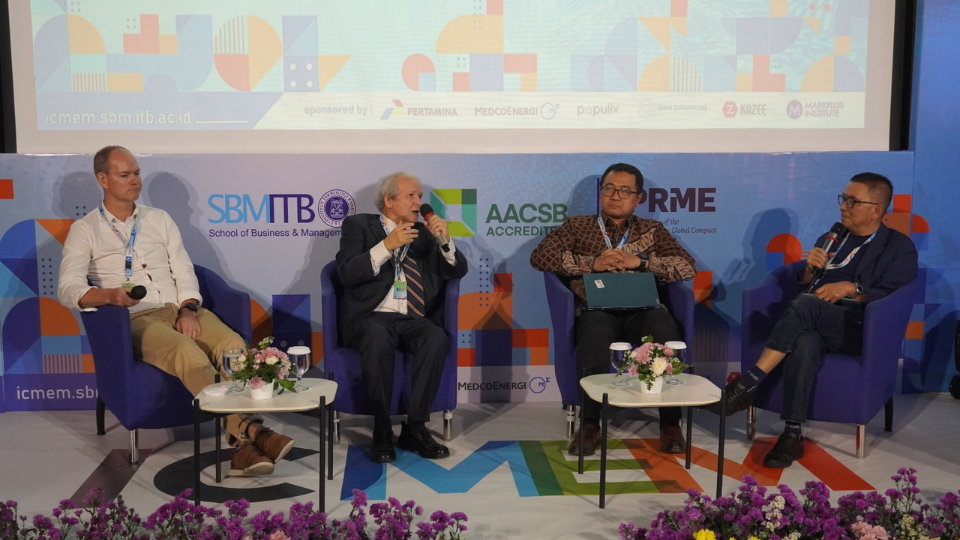Will developing countries like Indonesia continue to be markets for global innovative products? Are developing countries capable of becoming producers of sustainable innovation? These two questions were the main topics of discussion in the plenary session of the International Conference on Management in Emerging Markets (ICMEM) 2025, held by the SBM ITB, in Bandung on Tuesday (August 20).
Moderated by Helmy Yahya, experts including Prof. Shaker A. Zahra from the University of Minnesota, Assoc. Prof. Shane Mathews from Queensland University of Technology and Prof. Yos Sunitiyoso from SBM ITB, who also serves as an official at the Ministry of Higher Education, Science, and Technology, discussed future opportunities for sustainable innovation in developing countries. The speakers explored innovation issues from the perspectives of business strategy, public policy, and the readiness of national ecosystems.
According to Prof. Zahra, the limitations of developing countries are not barriers, but rather sources of energy for innovation and leapfrogging. According to him, emerging markets are the frontier where the future of sustainable innovation is being shaped.
He emphasized the importance of dynamic capabilities, specifically an organization’s ability to experiment, adapt, and change direction in the face of uncertainty. He continued by stating that organizations in developing markets must cultivate strategic flexibility to survive and foster innovation. For example, in Africa, limited access to traditional banks has led to the rise of mobile banking innovations.
“Limitations are often perceived as obstacles, but they can serve as catalysts for significant progress. The transition from being unbanked to utilizing digital services illustrates how emerging markets can advance more rapidly,” he explained.
He emphasized that developing countries should see challenges as opportunities for innovation rather than merely obstacles.
Additionally, Mathews stated that for Indonesia to progress alongside other developing nations, the key lies in establishing consistent long-term policies. He pointed out that China follows a steady strategy aimed at becoming a world leader in artificial intelligence and digitalization. This approach has allowed companies like Baidu and Huawei to emerge as global players.
“Indonesia presents opportunities, but a consistent long-term strategy is needed,” he stated. “If policies change with each election, the strategy cannot be sustainable. Innovation requires a significant time investment, typically 15 to 20 years.”
Vietnam is another example of how consistent policies can attract foreign investment. The Vietnamese government, he said, focuses on developing the industrial sector with clear and stable regulations. As a result, many multinational companies have chosen Vietnam as a production base.
“If Indonesia wants to catch up, it must be able to create similar certainty. Digitalization opens up access to global markets, but all of that will be in vain without consistency,” he added.
Meanwhile, Yos Sunitiyoso emphasized the need for synergy between universities, industry, and the government, or what he called the triple helix, to encourage sustainable innovation.
“We at the Ministry have prepared an incentive scheme so that university research can be directly utilized by industry,” Yos said. “Indonesia has huge demographic potential, but without a consistent strategy, this opportunity could be lost.”
He added that the national strategy should not only pursue economic growth but also incorporate sustainability aspects.
“ESG must be part of the strategy,” he said.
In discussing Indonesia’s demographic dividend, Professor Zahra highlighted the critical need for investment in the education sector.
He stated, “The demographic bonus will only be beneficial if there is a serious investment in education and innovation. Without such investment, unemployment is likely to increase.”
Mathews further emphasized that the younger generation is a valuable asset but requires a supportive ecosystem to thrive. He warned, “Without policy continuity, the demographic bonus could simply vanish.”
Yos reminded that Indonesia should not be satisfied with being a consumer nation. “The choice is ours: do we want to be a consumer nation, or a producer of innovation? The demographic bonus must be maintained with a clear and sustainable strategic direction.












